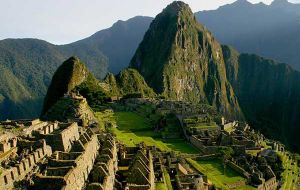MercoPress. South Atlantic News Agency
Peruvian families to take compensation claim for Machu Picchu to Unesco
 The impressive ruins from Inca time hanging from the Andes
The impressive ruins from Inca time hanging from the Andes Two Peruvian families who say the government never paid them compensation for the expropriation of the Inca citadel of Machu Picchu and surrounding lands plan to take their complaint to the U.N. Educational, Scientific and Cultural Organization.
The families are hoping Unesco will call the Peruvian government’s attention to the delay in solving the problem via the court system, Fausto Salinas attorney for the families said.
Fausto argues that the UN convention on the matter stipulates that the State’s right to cultural assets, such as Machu Picchu, cannot supersede domestic property law.
“Unesco must know that the same way it protests to the government when it does not adequately protect Machu Picchu, it also should call its attention to this matter,” the attorney said.
The Abril and Zavaleta families have been locked in a dispute with the Peruvian government since 2004 over ownership, respectively, of the ruins and 22,000 hectares (85 sq. miles) of land inside what today is the Machu Picchu Archaeological Park.
Salinas said their rights to those lands have been legally registered since the 19th century.
In 1944, the Abril sold the estate that included the ruins and lands to the Zavaletas. However, the sales contract states that the archaeological ruins are not part of the contract because they were in the process of being expropriated.
“The state said at that time ‘we’re going to expropriate,’ but the process was never completed, and in Peru, as in international law, if the property is not expropriated from you, you don’t lose it,” Salinas said.
According to the attorney, the two families have since sought to secure recognition to their claims to the property and ensure that any expropriation – if necessary – be carried out in strict compliance with the law.
The state, for its part, says it already owns the more than 32,000 hectares (123 sq. miles) that make up the archaeological park and that that ownership is duly recorded in the regional land registry.
Salinas, however, says that registration is invalid because it was carried out improperly in 1997 and that a subsequent claim to the property filed by the Zavaletas was decided in their favour.
The attorney’s main complaint, however, pertains to the slow pace of the legal process, which he says is due to “a series of dilatory manoeuvres by the Peruvian state to prolong the matter and avoid a solution.




Top Comments
Disclaimer & comment rules-

Read all commentsYes, quite typical behaviour of any government anywhere in the world. Typical and unforgivable.
Sep 09th, 2011 - 08:11 pm 0Commenting for this story is now closed.
If you have a Facebook account, become a fan and comment on our Facebook Page!